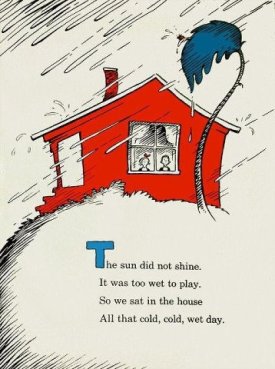What are your favourites?
 Thursday, July 25, 2013 at 9:25PM
Thursday, July 25, 2013 at 9:25PM  The Different Lives of Dogs by Ida Waugh
The Different Lives of Dogs by Ida Waugh
The editing process has shown me that I favour certain words and expressions. I don’t notice them when I’m capturing the story for the SFD. But when I go back and revise, I’m astonished at how certain phrases are repeated many times. Even though many eyes will pore over my book before it goes to print I’m nervous that I’m going to bore my readers by my favouritism.
Word count: 442 Reading time: 1-2 minutes
Because I’ve seen this kind of tic in other writers’ work, I know it happens, even after the most meticulous editing. A couple of years ago I read a memoir where the author loved the verb schlep; he used it in almost every chapter. Recently I read a book by a different author where his characters frequently ‘bellied up’ to the table. The first time I read that it was a unique and fun image. By the third time, it jumped out like someone had underlined it.
I’m not casting stones here – I know all too well how easily my darlings slip into my writing. I let them curl up in front of the warm winter fire and shut the rest out. Sometimes this is the right thing to do. It shows I’m comfortable with my vocabulary as Stephen King (On Writing) encourages writers to be. By sticking with words we know, he says, we find our own voices.
Then I think of my own exasperation when authors fixate on an odd word like the two examples above and I read my draft one more time. In spite of all the dissenting opinions on this question, I even reach for the thesaurus when I’m stuck. It’s a valuable writing tool. Like any tool though, it has to be used with discretion. Not all synonyms are created equal and I hesitate if I find one that is unfamiliar. If I trip across an unknown word that sounds wonderful, I look it up in several dictionaries. If it means what I need it to, I happily use it. But I have to be comfortable with context. A thesaurus is a tool to keep the engine running, to push through vocabulary block; it's important not to let it misguide me.
Until then, I’ll try to stop myself from incessant use of xxx, xxx, and xxx. I’m not actually sharing my sins because I hope to be free of them before the end of this summer. At least in this manuscript.
Do you have favourite words that crop up in your manuscript no matter how hard you try to banish them? Do you find them for yourself or do you have a critique partner who keeps you honest?
***
Image from Wikimedia Commons: Different Lives of Dogs by Ida Waugh
Thanks for Judy Mayhew for pointing me to this valuable tool: WordCloud





